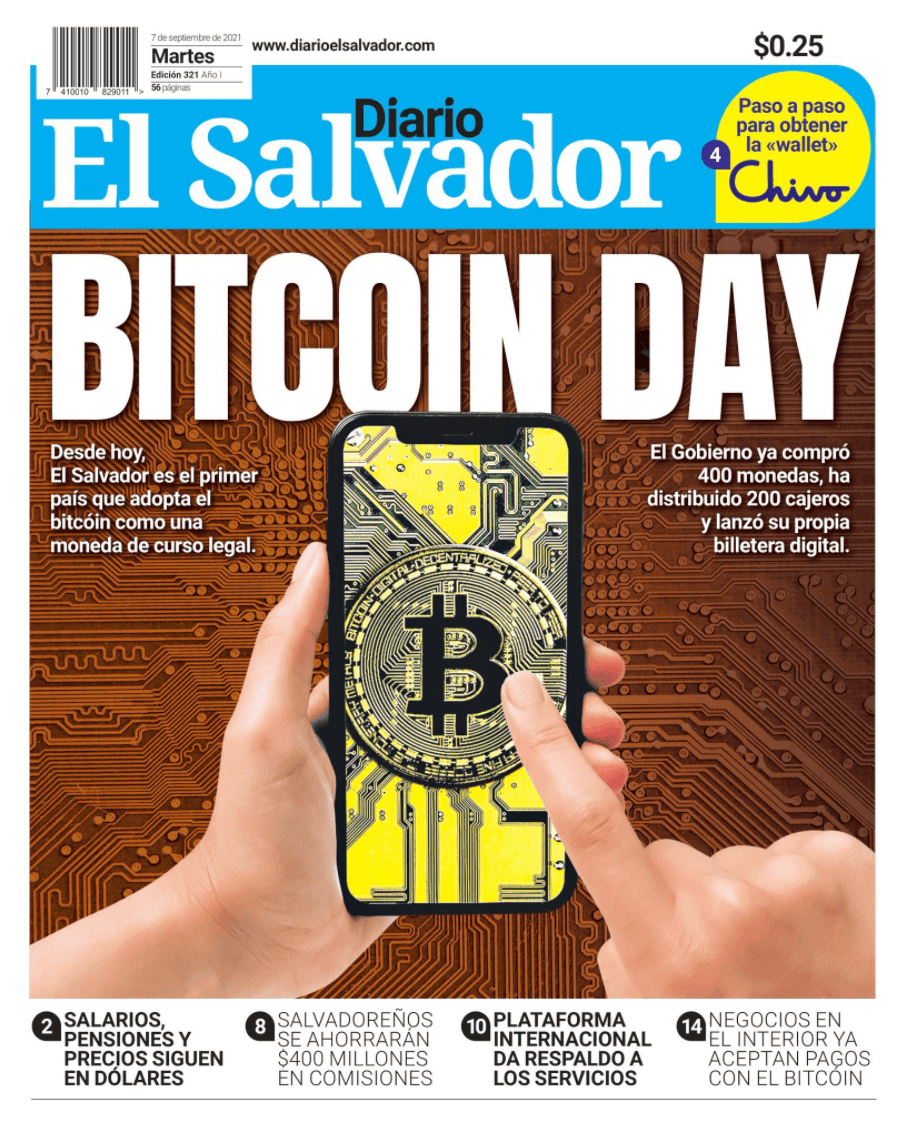Forced by the president, supported by the legislature and judiciary. On September 7, the law making Bitcoin an officially recognized means of payment came into force in El Salvador. This makes the Central American state with about six million inhabitants the first country in the world where residents can officially pay with Bitcoin. This law stipulates that every merchant, every company must accept the digital currency as a means of payment – and of course must create the necessary technical prerequisites for this. In addition to the purchase and sale of goods and services, taxes can now also be paid in Bitcoin (this is the case in Switzerland, for example, in the Canton of Zug).
Now the law has officially come into force and President Nayib Bukele also proclaimed #BitcoinDay. He was and is not tired of celebrating this step in detail. El Salvador’s move also encouraged many other countries – especially in Latin America – to introduce Bitcoin as legal tender. Panama is also considering a BTC introduction.
El Salvador Buys 400 Bitcoin
President Nayib Bukele already announced in advance on his preferred means of communication, Twitter, that the state has now acquired 400 Bitcoins.
El Salvador just bought 200 new coins.
We now hold 400 #bitcoin#BitcoinDay 🇸🇻
— Nayib Bukele 🇸🇻 (@nayibbukele) September 6, 2021

…And Makes History
Without question: El Salvador is making history with this law. It brings a lot of attention to the small and rather poor country. The global Bitcoin community in particular is celebrating this step in detail. So extensively that there has been a call to buy US$30 worth of Bitcoin to celebrate the day.
The amount of 30 US dollars refers to the Bitcoin gift worth 30 US dollars for all residents of El Salvador who install the Chivo app.
Residents between Skepticism and Restraint
Although there is a large-scale support program that is intended to allay fears and uncertainty in dealing with Bitcoin, the population is still skeptical and in some cases even opposed. This was shown by a survey among the residents.
Survey: Salvadorans and Bitcoin
The government is working with various incentives: no capital gains tax will be levied on the exchange of Bitcoin. However, the tax relief is unlikely to appeal to the majority of the poor population as much as a starting balance of 30 US dollars. Everyone receives this when they download the “official” Wallet Chivo. In addition, over 200 ATMs, so-called Chivo ATMs, are to be installed throughout the country.
Incidentally, the Chivo app was overloaded at the beginning. This was mainly due to the fact that many new users were discovering the crypto market for themselves. With this step, El Salvador is making Bitcoin public for six million people. Since it can be assumed that only a fraction of the population currently owns Bitcoins, six million people are opening up completely new financial opportunities.
Even if there is criticism from the population, some residents appreciate this step – especially thanks to the gift of 30 US dollars.
Historic Moment for Bitcoin
It took a little more than twelve years for Bitcoin to actually become what it was intended to be. The fact that cryptocurrencies have arrived in the mainstream should have become clear to most people at the latest since Tesla’s acceptance.
But even if El Salvador is a comparatively small country, the step of introducing Bitcoin as legal tender is probably the biggest moment in the crypto scene from a historical perspective.
For years, the crypto scene has been fighting against regulations by the authorities in numerous countries. On the other hand, there are repeated cases of fraud in the crypto sector. The Bitcoin is warned about all the more. Cryptocurrencies are a pure speculation object with no benefit and enormous risks. Now it is a currency. Like the US dollar, like the euro or like the franc.
Thousands of events surrounding Bitcoin have taken place in over a decade. Thousands of other currencies have emerged. For the first few years, Bitcoin was something that only “nerds” and criminals had. In fact, the major media hadn’t really had cryptocurrencies in their sights yet.
Bitcoin in El Salvador Harbors Enormous Risk
As historic as the moment is, the greater the risk that has now been taken. El Salvador’s economy is dependent on external factors anyway. It is dependent on the US dollar and transactions from abroad. 70 percent of residents do not have their own bank account. Many employees are employed unregistered. This means that the state loses tax revenue.
Will Bitcoin Solve El Salvador’s Problems?
Bitcoin is supposed to change this. Can Bitcoin combat undeclared work in the country? Even if that is one of the goals, it is quite unlikely. Someone who works unregistered can do this with or without a bank account. The same therefore applies with and without Bitcoin.
In contrast to fiat money, cryptocurrencies are not available in cash. Only with the abolition of the US dollar and the introduction of Bitcoin as the sole legal tender could undeclared work be combated in that case – but only if every wallet is registered and payments are not made in foreign currencies. Even if the US dollar were to be abolished, it would not be an obstacle to paying employees in US dollars.
Worth reading: A suburban experience report – On the road in El Salvador
What Happens if Bitcoin Fails in El Salvador?
Foreign transactions involve high fees. Bitcoin could actually remedy this. But on closer inspection, even the biggest Bitcoin fan has to admit that there are numerous cryptocurrencies on the market that are suitable as a real means of payment. In terms of fees and transaction speed, Bitcoin has been extremely overtaken. Bitcoin, on the other hand, is ideally suited as digital gold.
On the other hand, this is also a reason why BTC could work as a currency. Bitcoin is volatile, but not as volatile as other cryptocurrencies. If Bitcoin loses ten percent in value, the altcoins go twice as far down.
Bitcoin is more stable in value than other cryptocurrencies, so people don’t have to worry about such a big drop as with altcoins. Nevertheless, Bitcoin’s weaknesses in transactions are clear.
The market is very emotional. What happens if the Bitcoin project fails in El Salvador? What if El Salvador simply doesn’t have the patience and discards the project after a short time? This could make many doubt whether Bitcoin can ever prevail as legal tender.
Is Bitcoin’s Influence Already there in the Country?
In fact, it will take a while for Bitcoin to finally arrive in El Salvador. Despite its introduction as legal tender, a survey shows that over 90 percent of people still know nothing about Bitcoin.
This means that educational work will be very important in this case. Bukele has at least already recognized this in advance and taken steps in this regard.
In the future, numerous benefits will also be used to permanently attract Bitcoin investors to the country. This could certainly make economic sense in the long term. Together with the construction of Bitcoin mining centers, El Salvador could really become more independent from the USA.
At the beginning, however, Bitcoin is unlikely to change anything or hardly anything in El Salvador. The infrastructure is not yet developed enough and people in the country are not educated about cryptocurrencies.
Conclusion: Time Will Bring Certainty
Yes, the introduction of Bitcoin as legal tender is likely to be by far the greatest achievement of digital currencies. Countless new projects have been launched in the crypto sector in the past twelve years. The real benefit has so far failed to materialize for many projects.
Now it will be shown how a cryptocurrency fares in the real economy. Because at the beginning, Bitcoin and other cryptocurrencies were designed precisely for this purpose.
Despite the euphoria, one should not forget the risks this step entails. Because if the project fails, this could reduce the confidence of many investors in the crypto sector. Bukele’s authoritarian leadership style could at some point also turn out to be detrimental to Bitcoin.
It will be a long time before a real assessment can take place. It is important that El Salvador does not deviate from its course until then. This could throw the crypto market back again.
Nevertheless, the euphoria is currently quite justified. On May 22, 2010, the first documented Bitcoin transaction took place – 10,000 Bitcoins for a pizza. This day went down in history as “Bitcoin Pizza Day” and paved the way that led to countries like El Salvador today introducing Bitcoin as legal tender and proclaiming “Bitcoin Day”.
More Bitcoin News



